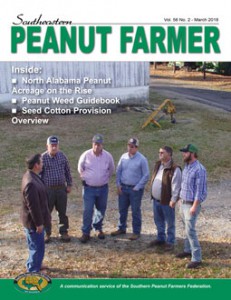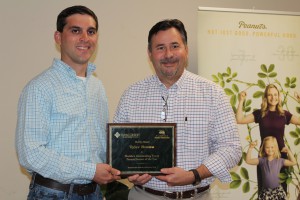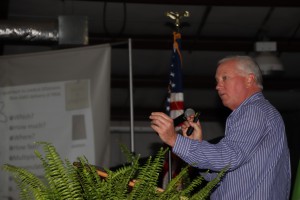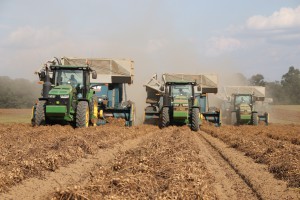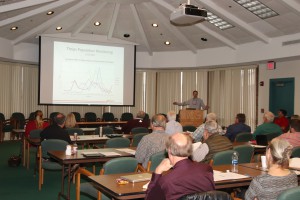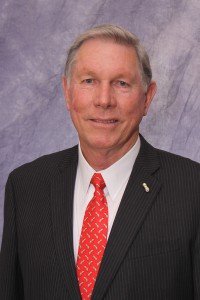State Conservationist Terrance O. Rudolph of the U.S. Department of Agriculture’s (USDA) Natural Resources Conservation Service (NRCS) and Marty McLendon, chairman of the Flint River Soil and Water Conservation District (SWCD) recently announced that a sign up for the Climate Resiliency in Georgia, Florida and Alabama project is under way. The deadline for eligible producers in Georgia to apply is April 20, 2018.
 This multi-state project covering Alabama, Florida and Georgia is one of 88 projects across the country that was selected for funding through last fiscal year’s Regional Conservation Partnership Program (RCPP). The project area is the Apalachicola, Chattahoochee, Flint and Ochlocknee river basins in each respective state. The 62 Georgia counties include Banks, Calhoun, Carroll, Chattahoochee, Cherokee, Clay, Clayton, Cobb, Colquitt, Coweta, Crawford, Crisp, Dawson, Decatur, Dekalb, Dooly, Dougherty, Douglas, Early, Fayette, Forsyth, Fulton, Grady, Gwinnett, Habersham, Hall, Harris, Heard, Henry, Houston, Lamar, Lee, Lumpkin, Macon, Marion, Meriwether, Miller, Mitchell, Monroe, Muscogee, Paulding, Peach, Pike, Quitman, Rabun, Randolph, Schley, Seminole, Spalding, Stewart, Sumter, Talbot, Taylor, Terrell, Towns, Troup, Turner, Webster, White, Worth, Union and Upson counties.
This multi-state project covering Alabama, Florida and Georgia is one of 88 projects across the country that was selected for funding through last fiscal year’s Regional Conservation Partnership Program (RCPP). The project area is the Apalachicola, Chattahoochee, Flint and Ochlocknee river basins in each respective state. The 62 Georgia counties include Banks, Calhoun, Carroll, Chattahoochee, Cherokee, Clay, Clayton, Cobb, Colquitt, Coweta, Crawford, Crisp, Dawson, Decatur, Dekalb, Dooly, Dougherty, Douglas, Early, Fayette, Forsyth, Fulton, Grady, Gwinnett, Habersham, Hall, Harris, Heard, Henry, Houston, Lamar, Lee, Lumpkin, Macon, Marion, Meriwether, Miller, Mitchell, Monroe, Muscogee, Paulding, Peach, Pike, Quitman, Rabun, Randolph, Schley, Seminole, Spalding, Stewart, Sumter, Talbot, Taylor, Terrell, Towns, Troup, Turner, Webster, White, Worth, Union and Upson counties.
Producers in these Georgia counties looking to improve on-farm climate change resiliency through water use efficiency, energy efficiency, and soil health on cropland; mitigate wildfire risk, increase carbon sequestration, and enhance wildlife habitat on forestland; enhance soil health, manage nutrients and improve water quality on grazing land as well as animal feeding operations, should visit their local USDA Service Center and submit their Conservation Program Application (NRCS-CPA-1200) before the April 20 deadline. Sign up in Alabama and Florida were announced by their respective NRCS State Conservationists.
“We are proud to once again work with the Flint River SWCD and its partners to help address some of their region’s most important challenges,” Rudolph says. “Their commitment to these river basins is inspiring and we are glad to be a part of it.”
The Flint River SWCD is based in southwest Georgia, but will lead this multi-state project that begins in the headwaters of northeast Georgia, heading southwestern to the Gulf of Mexico.
“We are very pleased to be partnering with the NRCS and our many partners on another vitally important project to our region,” McLendon says. “It’s through partnerships on the local level all the way up to Washington D.C. that we make some of the longest lasting and positive impacts.”
Created by the 2014 Farm Bill, the RCPP is a partner driven, locally-led approach to conservation. It offers new opportunities for NRCS to harness innovation, welcome new partners to the conservation mission, and demonstrates the value and efficacy of voluntary, private lands conservation.
More information on NRCS conservation programs can be found at http://www.ga.nrcs.usda.gov under the Programs tab.
 Producers surveyed across the United States intend to plant an estimated 1.5 million acres of peanuts in 2018, down 18 percent from last year, according to the Prospective Plantings report released recently by the USDA’s National Agricultural Statistics Service (NASS).
Producers surveyed across the United States intend to plant an estimated 1.5 million acres of peanuts in 2018, down 18 percent from last year, according to the Prospective Plantings report released recently by the USDA’s National Agricultural Statistics Service (NASS).
 This multi-state project covering Alabama, Florida and Georgia is one of 88 projects across the country that was selected for funding through last fiscal year’s Regional Conservation Partnership Program (RCPP). The project area is the Apalachicola, Chattahoochee, Flint and Ochlocknee river basins in each respective state. The 62 Georgia counties include Banks, Calhoun, Carroll, Chattahoochee, Cherokee, Clay, Clayton, Cobb, Colquitt, Coweta, Crawford, Crisp, Dawson, Decatur, Dekalb, Dooly, Dougherty, Douglas, Early, Fayette, Forsyth, Fulton, Grady, Gwinnett, Habersham, Hall, Harris, Heard, Henry, Houston, Lamar, Lee, Lumpkin, Macon, Marion, Meriwether, Miller, Mitchell, Monroe, Muscogee, Paulding, Peach, Pike, Quitman, Rabun, Randolph, Schley, Seminole, Spalding, Stewart, Sumter, Talbot, Taylor, Terrell, Towns, Troup, Turner, Webster, White, Worth, Union and Upson counties.
This multi-state project covering Alabama, Florida and Georgia is one of 88 projects across the country that was selected for funding through last fiscal year’s Regional Conservation Partnership Program (RCPP). The project area is the Apalachicola, Chattahoochee, Flint and Ochlocknee river basins in each respective state. The 62 Georgia counties include Banks, Calhoun, Carroll, Chattahoochee, Cherokee, Clay, Clayton, Cobb, Colquitt, Coweta, Crawford, Crisp, Dawson, Decatur, Dekalb, Dooly, Dougherty, Douglas, Early, Fayette, Forsyth, Fulton, Grady, Gwinnett, Habersham, Hall, Harris, Heard, Henry, Houston, Lamar, Lee, Lumpkin, Macon, Marion, Meriwether, Miller, Mitchell, Monroe, Muscogee, Paulding, Peach, Pike, Quitman, Rabun, Randolph, Schley, Seminole, Spalding, Stewart, Sumter, Talbot, Taylor, Terrell, Towns, Troup, Turner, Webster, White, Worth, Union and Upson counties.
